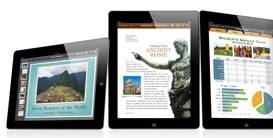I updated my Blackberry Playbook yesterday to the new OS, and I was struck with a confluence of ironies when it comes to the current crop of tablet computers: We have a company that made its name in messaging (RIM) that took a year to deliver a substandard email app to its tablet. We have a company that made its name in graphical interfaces (Apple) that doesn’t support many graphical websites on its tablet. And we have a company that made its name in online ecommerce (Amazon) that delivers a substandard Web browsing experience on its tablet.

Wouldn’t it be nice to have the best of all three rolled up into one? Yes it would. But we aren’t going to see that anytime soon. I am not alone: our story yesterday about common tablet gripes can be found here.
I like some of the features from each of the tablet trio of iPad/Fire/Playbook. But each of them also infuriates me for different reasons. Since the new Playbook OS has just arrived, let’s pick on it first.
RIM has made it easier to connect the Playbook to your email, Facebook, Twitter and LinkedIn accounts. That should be impressive, but the way they have gone about doing this is so wrong-headed.
Strike one: their messaging client is sub-par. You have non-threaded conversations for each account. This means that you see separate messages in your thread, which is something that Gmail had oh, six years ago. And if you want to group delete messages? Can’t do it.
Strike two: the various accounts are segregated by their component features. You read your LinkedIn or Twitter Inbox in the Messaging client, you see your Gmail Calendar in the Calendar client, and see your contacts for everyone in the Contacts client. You can’t view your complete Twitter stream or see any of your LinkedIn discussions in anything but their respective Web clients, which means using two or three or even four different interfaces as you move around one of your services. That is progress?
Strike three: Missing apps. There isn’t any Blackberry IM client for the Playbook. Ironic, when this is one of the compelling reasons that people use the original Blackberry smartphones. Ditto on a Kindle app.
Strike four: That darn power button. I had forgotten in the ensuing months where my Playbook was gathering dust on my shelf how annoying it was. At least the Fire’s on/off button is big enough and protrudes far enough to operate!
At least the Playbook is cheap: you can get the 16 GB versions for $200 (on RIM’s website, as well as at OfficeDepot and ironically, at Amazon itself).
Now, I love the camera and video capture process on the Playbook (the Fire, of course doesn’t come with any camera). And I like the overall scrolling and controls on it versus the Fire, which tries to turn everything into an eReading-like experience, whether you just want to browse the Web or actually read a book. And at least the built-in browser is somewhat snappy, unlike the Fire where you can go out and get coffee and come back before even the simplest of pages loads up.
And the ultimate irony: none of these tablets is a true laptop replacement, unless you can make do without access to a good portion of your work environment. But is the Playbook fully baked, as my colleague Dan Rowinski suggested yesterday? Hardly.




















